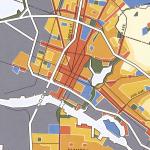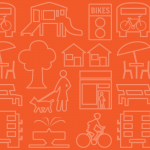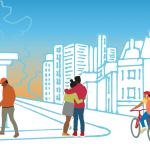ChangeLab Solutions is accepting applications for the Housing Solutions Collaborative ― a learning collective for cross-sector community teams that will offer peer support, technical assistance, and a stipend to help teams in eight cities advance legal and policy solutions to the growing housing crisis.
Apply now (Application Closed)
Why are we launching the Housing Solutions Collaborative?
Access to healthy, stable, and affordable housing is critical to everyone's health and well-being, but racist and discriminatory policies have led to place-based and race-based health inequities. Low-income Black and brown families are more likely to be severely burdened by housing costs and to live in poor-quality housing, resulting in increased exposure to lead and other environmental health hazards. Now the economic fallout from COVID-19 is compounding inequities in an already fractured housing system. Low-income renters of color have been particularly hard hit economically by the pandemic. All of these factors have long-term implications for access to quality housing that is affordable and stable, especially for the most vulnerably housed.
ChangeLab Solutions works across the nation to advance equitable laws and policies that ensure healthy lives for all. Our goal for the Housing Solutions Collaborative is to harness the expanded awareness of the consequences of structural racism in order to advance legal and policy solutions for housing that center equity, combat displacement, and ensure environmental justice. Using the tools of law and policy, we can address the drivers of health inequities in the housing system.
Through the Housing Solutions Collaborative, selected cross-sector community teams from up to eight small and mid-sized cities will convene in a peer learning collaborative over the period of a year to share information, engage in collective problem solving, network, and build the knowledge and capacity to drive strategies that address the housing crisis.
What will teams gain from participation?
- Peer learning collaborative. Teams will have access to a support network and ongoing opportunities to build their knowledge and capacity to advance housing strategies with a cohort of peer cities.
- Opportunities to learn from other housing experts. We will convene housing experts to speak on relevant topics, which will be curated to meet the needs of participating community teams.
- Tailored technical assistance. ChangeLab Solutions will provide individualized technical assistance to support research, development, or implementation of specific strategies such as tenant protections, neighborhood stabilization measures, preservation of affordable housing, and equitable enforcement approaches that ensure safe and decent rental housing.
- Stipend and travel support for participation. Each community team will receive $10,000 to support their active participation. Travel costs to an in-person convening in fall 2022 will also be covered if it is deemed safe to meet in person at that time.
What are the participation requirements?
During the project period from May 2021 to October 2022, community teams will actively participate in the following activities:
| Attend orientation webinar | June 2021 |
| Participate in check-in calls with ChangeLab Solutions staff | From July 2021 to August 2022, one 1-hour call will be held every other month. |
| Participate in virtual peer learning sessions | From August 2021 to August 2022, one session of 1-2 hours will be held every other month. |
| Attend Housing Solutions Collaborative convenings | Two convenings are tentatively scheduled for September 2021 and fall 2022. The convening held in September 2021 will be virtual. |
| Participate in information sharing and storytelling activities ChangeLab Solutions will partner with participating communities to identify and co-design opportunities (e.g., case studies or webinars) to share strategies and best practices. |
Ongoing |
| Participate in assessment and evaluation activities | Ongoing |
Who should apply?
No single individual or organization can address their community’s housing challenges on their own. The Housing Solutions Collaborative is designed to support cross-sector community teams that demonstrate a good-faith commitment to learning, solving problems, and acting together. Each participating team should include at least three individuals representing three different organizations or sectors. Three individuals will serve as the core members of each community team.
Strong preference will be given to teams that
- Include both community representation (e.g., community-based organization, resident, community group, or advocate) and local government representation (e.g., elected official, local government staff);
- Work in small and mid-sized cities with a population of 50,000 to 500,000;
- Work in communities in the following states: Alabama, Illinois, Indiana, Iowa, Kansas, Kentucky, Michigan, Minnesota, Missouri, Montana, Nebraska, New York, North Carolina, North Dakota, Ohio, Oklahoma, Pennsylvania, South Dakota, Tennessee, Texas, Vermont, Virginia, West Virginia, and Wisconsin;
- Demonstrate a clear commitment to advancing racial and social equity.
Our preferences in terms of size of city and location in priority states are indicated, however, we will review all applications received. No applications will be excluded based on these criteria.
Application (Closed)
Please use our online application survey; we will not be accepting applications through email.
We have provided a downloadable PDF of the survey questions to aid you in preparing your answers.
DEADLINE EXTENDED: Applications are due by 5:00pm PT / 8:00pm ET on Friday, April 16, 2021.
Please check this page periodically for updates and more information. We will be updating the FAQ section of this page as needed.
If you have any questions about the application process, please contact us at housing@changelabsolutions.org.
We plan to announce our selections in May.
Apply today! (Application Closed)
Frequently Asked Questions
What is the timeline for the project?
- April 2021: Applications due
- May 2021: Announcement of community team selections
- June 2021–August 2022: Virtual peer learning sessions and check-in calls
- Sept 2021: Kickoff Housing Solutions Collaborative convening (virtual)
- Fall 2022: Final Housing Solutions Collaborative convening and end of project period
What kind of technical assistance can ChangeLab Solutions provide?
We believe that good technical assistance is tailored to community needs. Our multidisciplinary team of lawyers, planners, policy analysts, and public health experts will offer technical assistance that may include one-on-one consultation; customized policy, legal, community planning, or public health research and analysis; customized written tools or resources; reviewing and providing feedback on draft policies, plans, and other written documents; or facilitation of connections to other experts.
Why focus on small and mid-sized cities?
Small and mid-sized cities face unique housing challenges but are likely to be constrained in their ability to develop policy responses and are more likely to have limited financial resources and staff capacity. Roughly 300 small and mid-sized cities in the United States account for 30% of the US population; therefore, housing solutions implemented in such cities have the potential to address the housing needs and challenges of a relatively large portion of the country’s population.
We’ve defined small and mid-sized cities as having a population of 50,000 to 500,000. While we are prioritizing cities within this range in the application selection process, cities outside of this range are still eligible to participate. We will review all applications received; no applications will be excluded based on these criteria.
Why focus on specific states?
We are prioritizing the participation of states that represent areas of the country dealing with multiple challenges related to housing. These states are more likely to have high rates of families experiencing severe rent burden and increased risks of exposure to lead and other environmental health hazards due to older housing stock and infrastructure. The legal and policy landscape in these states tends to favor landlords over tenants, evidencing a need for innovative approaches to address housing challenges in their localities.
While we are prioritizing certain states, all applications received will be reviewed. No applications will be excluded based on these criteria.
Why focus on working with cross-sector teams?
We believe that bold, sustainable, community-oriented housing solutions are possible when multiple stakeholders are involved, providing input, buy-in, and investments of time and resources. The strongest solutions are generated when community advocates work hand in hand with government decisionmakers.
What are core members of a community team?
Core members will serve as representatives of each community team. We are asking that three organizations per team act in this role. These members will be the primary points of contact for participation in Housing Solutions Collaborative activities and will represent the community team at meetings, virtual learning sessions, and other Housing Solutions Collaborative convenings. Other members of the team may participate in activities and attend meetings as well, but only core members will be required to participate for the duration of the project period.
How and when will the stipends be disbursed?
The stipend for active participation is $10,000 per community team. The stipend will be disbursed in two equal payments, the first of which will occur at the beginning of the project period, around June 2021. The second payment will be paid at the conclusion of the project period, around August 2022. These dates are subject to change. We can provide stipends to nonprofits, fiscally sponsored nonprofits (organizations without 501(c)(3) status), for-profit entities, or religious/faith-based groups.
4/16/2021


